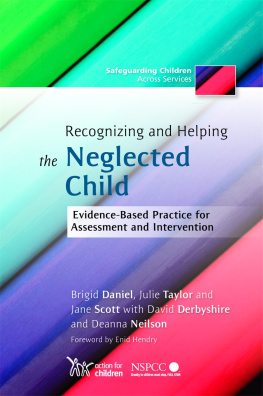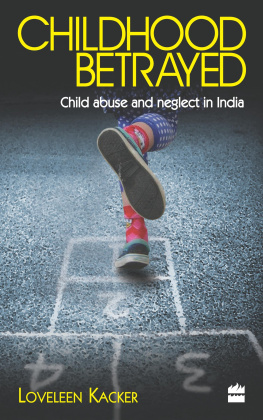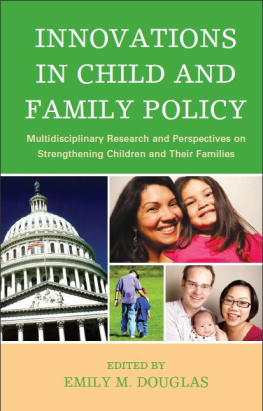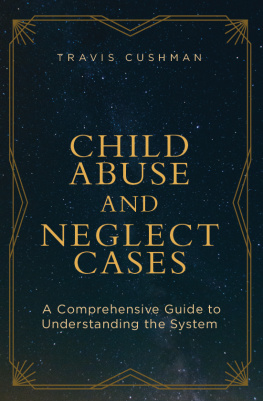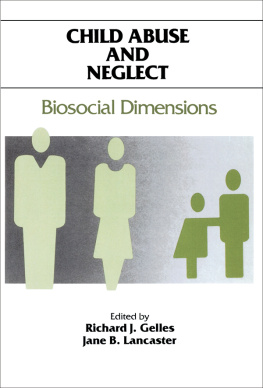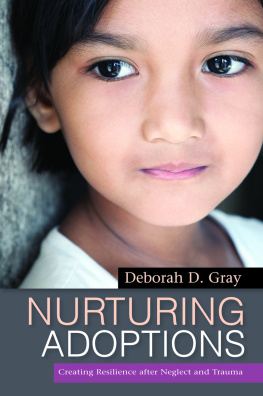FOREWORD
David Howe
For many years the neglect of children did not trigger the same sense of outrage as that caused when children were found to be victims of abuse. Neglect seemed to lack the drama and urgency of bruises and broken bones. But slowly, neglects long term, insidious and damaging effects were recognised. The research findings of developmental psychologists proved particularly important in helping child and family workers across all disciplines understand why neglect had to be treated much more seriously. It became apparent that deprivation and neglect starved children not only of physical care and sustenance but also emotional, social and intellectual stimulation. The neglect of the mind turns out to be just as critical as neglect of the body.
Children only become psychologically competent, socially fluent and emotionally intelligent beings when they have been in relationship with others who are themselves psychologically, socially and emotionally attuned, sensitive, interested, responsive and empathic. And of course the most powerful and influential of these relationships is that which children have with their primary caregivers. Children who are deprived of these reflective, reciprocal and responsive relationships will fail to develop these self-same psychosocial skills. This puts them at a huge developmental and social disadvantage. Lacking these skills, neglected children are at increased risk of poor physical health, poor mental health, reduced resilience, low educational attainment, and problematic social relationships. Researchers have also taught us that most parents of neglected children suffered abuse and neglect, rejection or trauma when they were children. Lacking the psychosocial skills to understand, empathise and respond to other peoples mental states they risk neglecting their own childrens psychological, social and health needs, just as their own were neglected when they were growing up.
Today, therefore, we have a reasonably good understanding of neglect, what causes it, and what the adverse effects are on young bodies and minds. We also know that there are huge costs to society when neglect is ignored. The price tag for dealing with the long-term consequences of neglect including increased risks of poor physical health, psychopathology, unemployment, substance abuse, and problematic parenting is very high. However, even when neglect is recognised, we are only just beginning to develop reliable ways of assessing its presence, character and extent. And perhaps least developed of all is how to prevent it in the first place, and if it is occurring, what to do about it. But there is progress and the current book reports the work of a number of pioneering, cutting edge specialists who are teaching us how to assess and treat cases of neglect in ways both creative and efficacious.
Stress, of course, runs as a corrosive thread through all cases of neglect. Stressed minds find it difficult to think about, or indeed care about others. And minds become stressed if they live in poverty, poor housing and communities of violence. It behoves practitioners always to start with the obvious. Help families deal with their material and nutritional needs whenever possible.
But minds that find it difficult to fathom other minds because they lack the mentalising skills that make relationships and social life intelligible also find interpersonal life stressful. Other people are a puzzle and strain. A vicious circle sets in. Stress further decreases the ability to empathise and see the world from other peoples point of view. Relationships become more difficult. It all becomes too hard thinking, planning, feeling, relating, deciding, caring, coping, hoping. Drink and drugs might dampen some of the pain. Switching off, sleeping, and withdrawing might solve the problem of how tough it is to make sense of and deal with others, particularly those who make demands on you, especially children. It is all very depressing. The parent who feels stressed, helpless and disconnected is no longer available, emotionally or psychologically, for the child who in turn feels abandoned and alone, unloved and frightened. The child, too, begins to experience stress and distress and so, like the parent, they have to develop ways of surviving, physically, emotionally and psychologically. These survival strategies, although they make sense in the context of the dysfunctional parentchild relationship, rarely help the child cope with the outside world. Their attempts to survive and stay safe are therefore relationship-specific but in the broader scheme of things, ultimately maladaptive.
In this excellent book, Ruth Gardner has brought together a number of leading international experts in the business of recognising and understanding, assessing and dealing with neglect. We hear of the latest research on what causes and sustains neglect. We are introduced to some imaginative and engaging ways of assessing neglect that actively and therapeutically involve the parents themselves. Profiles and ratings of current parenting practices are generated in collaboration with mothers, fathers and children. The ratings are then used to determine and discuss with the parents how they think they might move from a poor score to a better score, always building on whatever positives, however few and fleeting, might be present. And perhaps even more fittingly, several authors make the compelling case that the most powerful accounts of what it feels like to be neglected come from the children themselves. Whenever age allows, children need to be involved in helping professionals understand and assess what it feels like to be on the receiving end of care that is neglectful the shame, the hunger, the smell, the loneliness, the bullying, the fear, the pain, the strain, the sadness.
And finally, based on our current best understanding of neglect, and that it is always wise to collaborate with the parents and children themselves in formulating assessments, the book describes a number of original and inspired interventions. If neglectful parents are to recognise and become interested in their childrens bodies and minds, thoughts and feelings, responses and reflections, hopes and wishes, then practitioners have to become interested in the bodies and minds, thoughts and feelings, responses and reflections, hopes and wishes of the parents. Underpinning all successful interventions is the creation of a good workerfamily relationship in which trust, interest, belief, and above all, hope are present. We are shown a variety of ways in which these things can be done by building on whatever positives might be seen even in the thinnest of parentchild relationships using video interaction guidance techniques; offering support, skills acquisition, guidance and behavioural training; and building on the familys strengths, resources, networks. Change has to be seen as an endeavour that is purposeful, collaborative and shared.
This is a book full of sound thinking and original ideas. I defy anyone who reads this compilation not to come away feeling even more inspired, enthused and, yes, even optimistic as they work with both the parents who neglect and the children who are neglected.
David Howe
Emeritus Professor of Social Work
University of East Anglia


